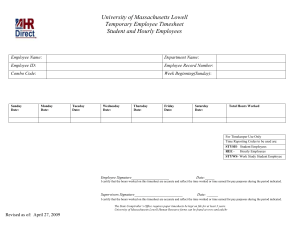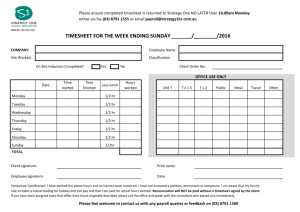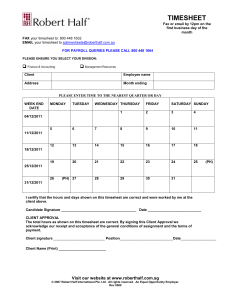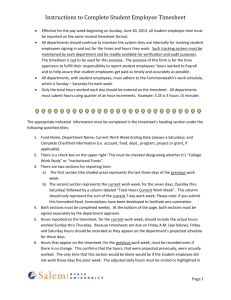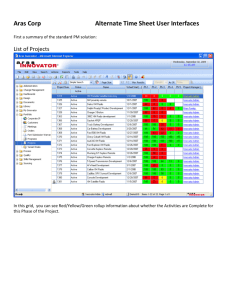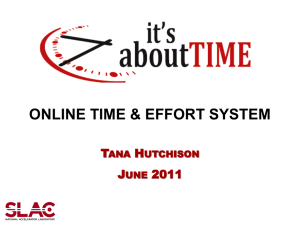Introducing Concur Time
advertisement
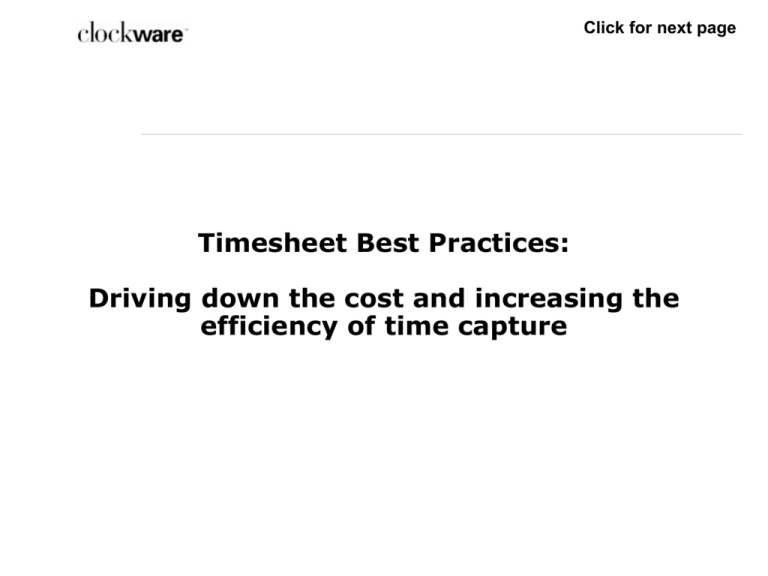
Click for next page Timesheet Best Practices: Driving down the cost and increasing the efficiency of time capture Click for next page Automating timesheets Challenges of automating timesheets Best practices solutions The payoff Return on investment Click for next page The Timesheets Business Challenge Addressing multiple business needs with one solution Click for next page Challenges of Timesheet Collection Lengthy Turn-around Times and Procedures Time and costs of tracking down late or missing time sheets Manual, paper-based approval process Drains on employee and project manager productivity Errors and Inefficiencies Time reporting errors due to inaccurate project codes and time data Re-key often required in Payroll or Billing Delayed billing cycles; slow turn-around on receivables Lack of Real-Time Data Inability to capture real-time billing and revenue data Difficulty tracking project status and cost Lead times in obtaining employee utilization information Click for next page The path of the timesheet today Employee Manager Timesheet Admin Finance 1. Admin has to remind employee to submit timesheet. 2. Employee enters time on paper timesheet and sends to Admin 3. Administrator contacts Finance to get updated project codes 4. Administrator sends timesheet to manager for approval 5. Manager returns approved timesheet to administrator 6. Administrator sends timesheet to appropriate finance staff 7. Finance enters timesheet into back office systems – including General Ledger, Payroll & Billing 8. Finance has to correct invalid project codes Back office systems Click for next page Typical problems with the process Employee Late Manager Incorrect Approver Illegible Signature Missing Info Paper Lost! Re-key Old Codes Timesheet Admin Invalid Back office Codes systems Finance Click for next page Best Practice Solutions for timesheets Streamline and automate Visibility Increase accountability Performance improvement Click for next page Streamlined and Automated timesheets Automated time capture increases efficiency and reduces the cost of: • Managing projects and activities that utilize crossdepartmental teams • Project resource allocation and utilization • Internal cost allocation and/or charge-backs • Time and attendance tracking Click for next page Why automate time reporting? Provides real time visibility into time recorded Eliminates paper forms and manual processing Reduces time collection and accounting costs Improves management of project costs Increases reporting accuracy Increases employee productivity Click for next page Process improvements Timesheet Admin Employee Clockware timesheets Manager Finance Back office systems 1. Employee receives a reminder if a timesheet is late 2. Employee complete electronic timesheet 3. System sends completed timesheet to appropriate manager 4. Manager reviews and approves timesheet 5. System sends approved timesheet to appropriate back office system Click for next page Improvement points Employee Eliminate Delays Timesheet Admin Eliminate Paper Clockware timesheets Automated Workflow No Re-keying Manager Finance Valid Codes Back office systems Click for next page Timesheets to Manage Projects Project managers should be able to answer the following questions: Am I within the budgeted amount for the phase or over all project – do I need to review my projections? Am I still within profitability on a ‘fixed bid’ or ‘negotiated’ contract? Do I have the right resources working on the right things to keep the project/phase on track? How do I effectively manage a project where the resources do not report to me? Click for next page To manage internal costs Empowers managers throughout the organization to answer the following questions: How do I drive more accurate and dynamic ‘activity’ based allocations vs. the standard ‘static’ internal General Ledger allocations? What are my true costs? What customers are truly profitable? What product lines/services are truly profitable? timesheets is a great complement to ABC or ABM Click for next page Core System Features Employee Employee Timesheet Entry Manager Manager Review & Approve • Custom timesheet styles • Role-based view of approvals • Pre-populated tasks and work items • Review projectspecific tasks • Unlimited hierarchy of project codes • Email notifications and reminders • Edit and add comments • Flexible approval methods Billing/ Payroll Finance Processing • Integration with project & billing systems System Admin Reporting & Administration • Real-time data access • Drill-down reporting • Standard import & export tools • Web-based admin tools Click for next page Process Improvements & Benefits • Increased productivity Employee • Any time, anywhere access • Project and tasks code default based on employee • Easy access to valid and active project codes Timesheet Admin • Streamlines and automates timesheet collection and reminder process • Timesheet data is validated on entry • System ensures that proper approvals are obtained Click for next page Process Improvements & Benefits • Real-time visibility to time recorded Manager • Timely billing and revenue recognition • Improved management of project resources • Increased focus on strategic activities • Elimination of re-key activities Billing & Payroll • Accelerated billing cycles and cash flow • Timely and accurate payroll processing Click for next page Case Study – Atex Media Solutions Provides content and information management solutions for publishers. Over 300 employees in 20 locations world-wide, many of whom are telecommuters. Project Objectives • Replace paper-based timesheets process • Improve effectiveness of management reporting tools Core Requirements • Fully web-based solution due to high number of remote employees • Ease-of-use and ease-ofdeployment • Compatibility with the company’s existing SQL database • Flexibility and ability to customize Results • Extremely easy to deploy • Very user-intuitive; minimal training required • Easy fit with SQL database • Managers able to view data in many different ways Click for next page Case Study – Volvo IT North America Formerly the IT division within Volvo, became an independent subsidiary in 1998. As a result, the 2500 employees in this centralized service organization needed the ability to track and bill time. Project Objectives • Implement centralized timesheets solution • Establish billing procedures to bill other Volvo organizations for products & services Core Requirements • System must be easy to install and manage • Easy to deploy • Easily accessible to all employees Results • 100% deployed in 60 days • Able to collect real-time performance and employee utilization data • Automated payroll data collection • Helps organization prioritize time • Employees bill time more effectively Click for next page What is your organizational readiness for automated timesheets? Questions for internal discussion Click for next page Key questions for internal discussion 1. Do we require employees/contractors to track time on paper or Excel timesheets? 2. Are managers responsible for authorizing timesheets before they are routed to the appropriate back office system for processing? 3. Do we have administrative employees who manage the timesheet process? 4. Do we need to be able to track time so that we can understand how much it costs us to develop and deliver products or services? 5. Would an automated timesheets solution would help us execute our Activity Based Costing/Management strategy more effectively? Click for next page Key questions for internal discussion 6. Which employees are required to record attendance data on a daily or weekly basis? 7. Do project managers frequently manage resources who do not report to them? 8. Is timesheet data is manually entered into the appropriate back office system by staff in our accounting, finance, payroll and/or billing departments? 9. Is time incurred by ‘overhead’ departments is charged back to the departments for whom the work was performed? 10. Do we charge third parties for work performed by our employees/contractors? Click for next page Costs of business as usual (BAU) What are the costs of our current timesheets process? What are our true costs for timesheet data collection and approval process? That is: employee, managers, accounting/payroll, billing Do we have double data entry costs? Are we losing money from: selling unprofitable products (not knowing our true costs) being over budget on fixed-bid contracts (not knowing our project costs from one phase to the next) Opportunity cost of: project budget over-runs poor resource allocation Click for next page Timesheets system savings Quick hit savings challenges: Timesheet data entry, submissions and approvals take an average of 2 hours per employee per month. Can you reducing these costs by 50%? Timesheet data entry errors and double key entry can cost $40,000 per year for every 100 employees. Can you reduce these costs by 80%? Timesheet lateness and change edits can slow billings or charge-backs. How much are we losing from late timesheets? A certain percentage of projects run over-budget because of poor visibility into project progress and costs. What percentage of our projects can be better managed from real-time project information? A certain percentage of projects miss deadlines because of inadequate resource allocation. What percentage of our projects would benefit from easier project monitoring and resource management?
